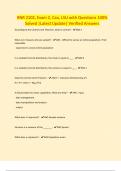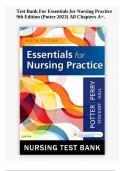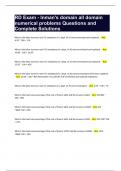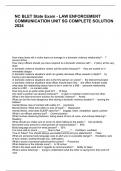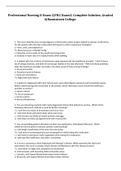1
6 September 2024
Unit 8: Devolution:
Devolution:
Westminster Parliament is sovereign and can, in theory at least, pass whatever legislation it likes for all four countries.
Westminster Parliament:
o Principal Source of Legal Power in the UK.
o Has the competence to legislate for the whole of the UK at all levels.
o Devolved certain powers to devolved legislature and could legally revoke those powers, but to do so
would have very significant political consequences.
Westminster has delegated some of its powers to the devolved legislatures without giving up
those powers.
The UK remains a Unitary State despite Devolution.
But, the UK has moved from being a very centralised state with power concentrated in London to one where, in some
areas at least, power is dispersed across the four countries.
Scottish Devolution:
Historical Development:
Union of Crowns 1603.
o Accession of Crowns following the accession of James I (VI of Scotland).
Acts of Union 1707.
o Abolished the separate Parliaments of England and Wales, and Scotland.
o Created the Parliament of Great Britain, with authority over all three countries.
o Scotland maintained a distinct legal system.
The Scottish National Party (SNP).
Referendum of Devolution 1979.
Scotland Act 1998.
Scottish Parliament and Executive.
‘Indyref’ & Scotland Act 2016.
Brexit.
Indyref 2.
Scottish Devolution:
Attempt 1: Late 1970s:
Scotland Act 1978: provided for the creation of a devolved assembly, subject to confirmation in a referendum.
Act required 40% of the eligible electorate to vote in favour of devolution.
Although a majority of those voting supported the creation of the assembly, they represented only 32.9% of
the eligible electorate.
Attempt 2: May 1997:
,2
6 September 2024
Referendums (Scotland and Wales) Act 1997 paved the way for referendums on devolution in Wales and
Scotland.
Substantial majority of Scottish voters supported the creation of a Scottish Parliament.
Section 63A, Scotland Act 1998 (added by the Scotland Act 2016), makes the Scottish Parliament and
Scottish Government permanent parts of the constitutional arrangements of the UK:
o Accordingly, neither institution may be abolished unless the people of Scotland vote for this in a
referendum.
Scottish Parliament:
Scotland Act 1998 established the Scottish Parliament and the Scottish Executive.
Scottish Parliament has 129 members (Members of the Scottish Parliament (MSPs)).
o 73 are Constituency Members.
Elected using ‘First Past the Post System’.
o 56 are Regional Members.
Elected from each of the 8 Scottish Regions.
Scottish Parliament has a Presiding Officer (equivalent to the Speaker) assisted by two or more deputies.
16- and 17-year-olds are allowed to vote in elections.
Following the Scottish Elections (Reform) Act 2020, an Act of the Scottish Parliament, time between
elections was increased from 4 to 5 years.
o An early election will take place it 2/3 of the MSPs vote in favour of it to Parliament does not
nominate a First Minister within 28 days of an election due to:
The First Minister resigning or otherwise ceasing to be First Minister; or
The First Minister ceasing to be an MSP otherwise than by dissolution or Parliament.
o First Minister must resign if the Government loses a vote of no confidence.
1998 Act gave the Scottish Parliament the power to pass primary legislation .
o Once the Scottish Parliament has passed a bill and it has received Royal Assent, it is known as an Act
of the Scottish Parliament.
Devolved Matters:
Scotland Act 1998, devolved to the Scottish Parliament all matters other than reserved matters.
‘Reserved Matters Model’:
o Scottish Parliament has the power to legislate on all matters that are not expressly reserved to
Westminster.
o Scottish Parliament has the power to legislate over a wide range of matters:
E.g., Health, Education, much of Civil and Criminal Law and Local Government.
o Reserved Matters:
Responsibility of the Constitution, Foreign Policy, Defence, etc…
2014: Indyref: UK promised to devolve further powers to Scotland should Scottish voters decide against
independence.
o Post INDYREF: UK Parliament devolved further powers on the Scottish Parliament
Scotland now has significant tax raising powers.
2015:
o Scotland has the power to levy its own Scottish Landfill Tax (a tax on the disposal of waste to
landfill) in place of the UK Landfill Tax and a Land and Buildings Transaction Tax (ADT) to replace
Air Passenger Duty, a tax levied on passengers departing from UK airports.
April 2016: Scotland can set a different rate of income tax.
, 3
6 September 2024
o Scottish Rate of Income Tx (SRIT).
April 2017:
o Scotland has the power to set it tax band thresholds (excluding the personal allowance) as well as the
rates.
Applies to all non-savings and non-dividend income of Scottish Taxpayers.
Scotland’s Legislative Competence:
Scotland Act 1998 provides that an Act of the Scottish Parliament is not law so far as any of its provisions are outside
the legislative competence of the Parliament, and expressly specifies which areas are outside its competence.
Provisions outside its legislative competence are those that:
Would form part of the law of any territory other than Scotland.
Relate to Reserved Matters.
Modify certain enactments, including specified provisions of the Union with Scotland Act 1706 and the Union
with England Act 1707 so far as they relate to the freedom of trade, certain specified provisions of the
European Communities Act 1972 (until the transition period ended), the European Union (Withdrawal) Act
(EUWA) 2018 and the Human Rights Act 1998.
Are incompatible with the ECHR and, until the transition period ended, with European Union Law.
Would remove the Lord Advocate from their position as head of the systems of criminal prosecution and
investigation of deaths.
The Scottish Parliament has power to amend Acts of the UK Parliament unless the subject matter of the bill is
outside its legislative competence.
Process of a Bill:
The Minister in Charge of the Bill must make a statement that in their view, the provisions of the bill are
within the Scottish Parliament’s legislative competence.
o Minister’s Statement must assert the Parliament’s legislative competence.
Presiding Officer must make a statement on legislative competence, but this differs from that of the minister
in charge.
o Statement may, with reasons, indicate that in their opinion the bill is outside its competence.
o Statement does not preclude the bill from proceeding.
Neither the opinion of the Minister or the Presiding Officer is conclusive on the Parliament’s legislative
competence.
o Thus, the Advocate General (the UK Government’s chief legal adviser on Scots law), the Lord
Advocate or the Attorney-General may refer to the Supreme Court the question whether a bill or any
of its provisions are within the Parliament’s legislative competence.
Scotland Act 1998: where a provision is an Act of the Scottish Parliament could be read as being outside its legislative
competence, such a provision is to be read as narrowly as is required for it to be within competence, if such reading is
possible (Section 101(2), Scotland Act 1998).
Scottish Government:
Headed by the First Minister (currently Nicola Sturgeon), who is appointed by the Monarch.
6 September 2024
Unit 8: Devolution:
Devolution:
Westminster Parliament is sovereign and can, in theory at least, pass whatever legislation it likes for all four countries.
Westminster Parliament:
o Principal Source of Legal Power in the UK.
o Has the competence to legislate for the whole of the UK at all levels.
o Devolved certain powers to devolved legislature and could legally revoke those powers, but to do so
would have very significant political consequences.
Westminster has delegated some of its powers to the devolved legislatures without giving up
those powers.
The UK remains a Unitary State despite Devolution.
But, the UK has moved from being a very centralised state with power concentrated in London to one where, in some
areas at least, power is dispersed across the four countries.
Scottish Devolution:
Historical Development:
Union of Crowns 1603.
o Accession of Crowns following the accession of James I (VI of Scotland).
Acts of Union 1707.
o Abolished the separate Parliaments of England and Wales, and Scotland.
o Created the Parliament of Great Britain, with authority over all three countries.
o Scotland maintained a distinct legal system.
The Scottish National Party (SNP).
Referendum of Devolution 1979.
Scotland Act 1998.
Scottish Parliament and Executive.
‘Indyref’ & Scotland Act 2016.
Brexit.
Indyref 2.
Scottish Devolution:
Attempt 1: Late 1970s:
Scotland Act 1978: provided for the creation of a devolved assembly, subject to confirmation in a referendum.
Act required 40% of the eligible electorate to vote in favour of devolution.
Although a majority of those voting supported the creation of the assembly, they represented only 32.9% of
the eligible electorate.
Attempt 2: May 1997:
,2
6 September 2024
Referendums (Scotland and Wales) Act 1997 paved the way for referendums on devolution in Wales and
Scotland.
Substantial majority of Scottish voters supported the creation of a Scottish Parliament.
Section 63A, Scotland Act 1998 (added by the Scotland Act 2016), makes the Scottish Parliament and
Scottish Government permanent parts of the constitutional arrangements of the UK:
o Accordingly, neither institution may be abolished unless the people of Scotland vote for this in a
referendum.
Scottish Parliament:
Scotland Act 1998 established the Scottish Parliament and the Scottish Executive.
Scottish Parliament has 129 members (Members of the Scottish Parliament (MSPs)).
o 73 are Constituency Members.
Elected using ‘First Past the Post System’.
o 56 are Regional Members.
Elected from each of the 8 Scottish Regions.
Scottish Parliament has a Presiding Officer (equivalent to the Speaker) assisted by two or more deputies.
16- and 17-year-olds are allowed to vote in elections.
Following the Scottish Elections (Reform) Act 2020, an Act of the Scottish Parliament, time between
elections was increased from 4 to 5 years.
o An early election will take place it 2/3 of the MSPs vote in favour of it to Parliament does not
nominate a First Minister within 28 days of an election due to:
The First Minister resigning or otherwise ceasing to be First Minister; or
The First Minister ceasing to be an MSP otherwise than by dissolution or Parliament.
o First Minister must resign if the Government loses a vote of no confidence.
1998 Act gave the Scottish Parliament the power to pass primary legislation .
o Once the Scottish Parliament has passed a bill and it has received Royal Assent, it is known as an Act
of the Scottish Parliament.
Devolved Matters:
Scotland Act 1998, devolved to the Scottish Parliament all matters other than reserved matters.
‘Reserved Matters Model’:
o Scottish Parliament has the power to legislate on all matters that are not expressly reserved to
Westminster.
o Scottish Parliament has the power to legislate over a wide range of matters:
E.g., Health, Education, much of Civil and Criminal Law and Local Government.
o Reserved Matters:
Responsibility of the Constitution, Foreign Policy, Defence, etc…
2014: Indyref: UK promised to devolve further powers to Scotland should Scottish voters decide against
independence.
o Post INDYREF: UK Parliament devolved further powers on the Scottish Parliament
Scotland now has significant tax raising powers.
2015:
o Scotland has the power to levy its own Scottish Landfill Tax (a tax on the disposal of waste to
landfill) in place of the UK Landfill Tax and a Land and Buildings Transaction Tax (ADT) to replace
Air Passenger Duty, a tax levied on passengers departing from UK airports.
April 2016: Scotland can set a different rate of income tax.
, 3
6 September 2024
o Scottish Rate of Income Tx (SRIT).
April 2017:
o Scotland has the power to set it tax band thresholds (excluding the personal allowance) as well as the
rates.
Applies to all non-savings and non-dividend income of Scottish Taxpayers.
Scotland’s Legislative Competence:
Scotland Act 1998 provides that an Act of the Scottish Parliament is not law so far as any of its provisions are outside
the legislative competence of the Parliament, and expressly specifies which areas are outside its competence.
Provisions outside its legislative competence are those that:
Would form part of the law of any territory other than Scotland.
Relate to Reserved Matters.
Modify certain enactments, including specified provisions of the Union with Scotland Act 1706 and the Union
with England Act 1707 so far as they relate to the freedom of trade, certain specified provisions of the
European Communities Act 1972 (until the transition period ended), the European Union (Withdrawal) Act
(EUWA) 2018 and the Human Rights Act 1998.
Are incompatible with the ECHR and, until the transition period ended, with European Union Law.
Would remove the Lord Advocate from their position as head of the systems of criminal prosecution and
investigation of deaths.
The Scottish Parliament has power to amend Acts of the UK Parliament unless the subject matter of the bill is
outside its legislative competence.
Process of a Bill:
The Minister in Charge of the Bill must make a statement that in their view, the provisions of the bill are
within the Scottish Parliament’s legislative competence.
o Minister’s Statement must assert the Parliament’s legislative competence.
Presiding Officer must make a statement on legislative competence, but this differs from that of the minister
in charge.
o Statement may, with reasons, indicate that in their opinion the bill is outside its competence.
o Statement does not preclude the bill from proceeding.
Neither the opinion of the Minister or the Presiding Officer is conclusive on the Parliament’s legislative
competence.
o Thus, the Advocate General (the UK Government’s chief legal adviser on Scots law), the Lord
Advocate or the Attorney-General may refer to the Supreme Court the question whether a bill or any
of its provisions are within the Parliament’s legislative competence.
Scotland Act 1998: where a provision is an Act of the Scottish Parliament could be read as being outside its legislative
competence, such a provision is to be read as narrowly as is required for it to be within competence, if such reading is
possible (Section 101(2), Scotland Act 1998).
Scottish Government:
Headed by the First Minister (currently Nicola Sturgeon), who is appointed by the Monarch.


